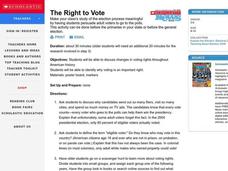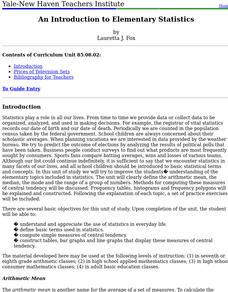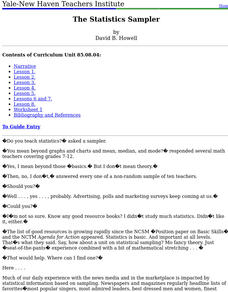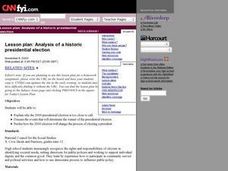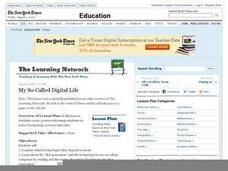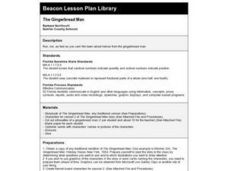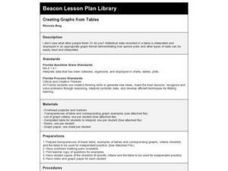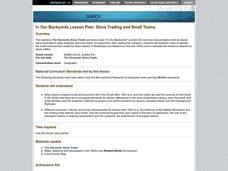Curated OER
Understanding Plagiarism Workshop Lesson Plan
High schoolers define the term plagiarism, they recognize plagiarism and are able to explain what constitutes appropriate use of others' words and ideas. Pupils are explained the notion of plagiarism such as: taking another's ideas is...
Curated OER
Border Art: the Study of Artworks Responding To the Border Between the United States And Mexico
Students discuss the concepts of immigration and migration and explore their own family's history. They examine the media's presentation of the Border Art Project and then incorporate their own views into what they have studied through...
Curated OER
The Right to Vote
In this voting worksheet, students identify and discuss changes in voting rights throughout American history.
Then, they identify why voting is an important right for Americans. Finally, students create voting bookmarks instead of or in...
Curated OER
Homonyms 5
For this vocabulary skills worksheet, pupils read 10 sentences and fill in the blanks in each sentence with the appropriate homonyms.
Curated OER
Philanthropy in Literature
Students define the term philanthropy and find examples of it in everyday life. In this philanthropy activity, students try to define philanthropy and illustrate it. Students then work in groups to define the term and create a web for...
Curated OER
Sampling Rocks
Students examine rocks. In this geology lesson, students collect rocks from the schoolyard and classify them by color, weight, and size. Students use a rock guide to identify each of the rocks.
Curated OER
A Birthday Basket for Tia
Students practice reading and math skills using technology. In this main idea instructional activity, students retell the important events of A Birthday for Tia in sequence using Kid Pix. Students create a bar graph using The Graph...
Curated OER
Chart This!
Learners collect and analyze data. In this middle school mathematics lesson, students collect data on three to four traits or favorites. Learners analyze their data and create a chart of graph for each trait or favorite they researched.
Curated OER
Immigration to the United States
Students discover the implications of immigration. In this immigration lesson, students read fiction based on immigration experiences as well as non-fiction on the topic. Students write and share book reviews of the literature they read.
Curated OER
Election 2005: Campaign Issues
Learners take a closer look at the election of 2005. In this British politics instructional activity, students listen to a lecture about the 2005 campaign and active citizenship. Learners then create collages and news boards about the...
Curated OER
Minority Report
Students examine race relations in Great Britain. In this current events lesson, students visit selected websites to understand the impact of immigration on the country as well as multiculturalism in the country.
Curated OER
Visual Communication of Quantative Data
Students collect and analyze data based on academic performance. In this statistics lesson, students create graphs and analyze the data they created. They use positive, negative and no correlation to analyze the data.
Curated OER
An Introduction to Elementary Statistics
Students explain and appreciate the use of statistics in everyday life. They define basic terms used in statistics and compute simple measures of central tendency.
Curated OER
The Statistics Sampler
Students define sample, describe a random sample, and discuss what compromises a sample. They determine a sample size to estimate a population characteristic with confidence.
Curated OER
United States Entry into World War I: Some Hypotheses About U.S. Entry
Students take a stand on a hypothesis for U.S. entry into World War I, supported by specific evidence.
Curated OER
Electoral Versus Popular Vote
Pupils gain an understanding of how the winner of the popular vote might not be the winner of the electoral vote by voting on a snack. They be divided into groups with a representative.
Curated OER
Analysis of a Historic Presidential Election
Learners research the 2000 presidential elections. They explain why the presidential winner was initially too close to call, discuss how the winner was determined and predict how the 2000 election might change the process of electing a...
Curated OER
My So-Called Digital Life
Students create posters informing students on school technology services and rules.
Curated OER
No New Workers Need Apply
Students explore older people's perspectives on work and retirement by creating charts to reflect statistical trends and formulate interview questions. They write follow-up articles that record and comment on the attitudes of their...
Curated OER
Un-Presidented Election
Students explore the results of the 2000 presidential election. They look back at important issues in the campaign and write newspaper articles which cover specific angles on the election.
Curated OER
The Gingerbread Man - Cutting in Half
Students use the gingerbread man that they made earlier in the day. They demonstrate how to cut the gingerbread man in half, leaving two fair shares or two pieces the same. The gingerbread man pattern is imbedded in an attached file in...
Curated OER
Creating Graphs from Tables
Students interpret data from tables and then create a graph to show the same data in a different organization.
Curated OER
Comparing the Satellite and Broadcast Radio Landscapes
High schoolers research the development of satellite technology over the last 50 years students explain how the enactment of the Telecommunications Act of 1996 changed the rules for corporate ownership of multiple media outlets.
Curated OER
SLAVE TRADING AND SMALL TOWNS
Students research the ways slavery shaped social and economic life in the South after 1800, the different economic, cultural, and social characteristics of slavery after 1800, and how the Atlantic slave trade finally ended.
Other popular searches
- Public Opinion Polling
- Polling Data
- Scientific Polling
- Polling System
- Polling Booth
- Polling Questions
- Polling Students
- Government Polling
- Polling Lesson Plans
- Polling Lesson
- Political Polling




